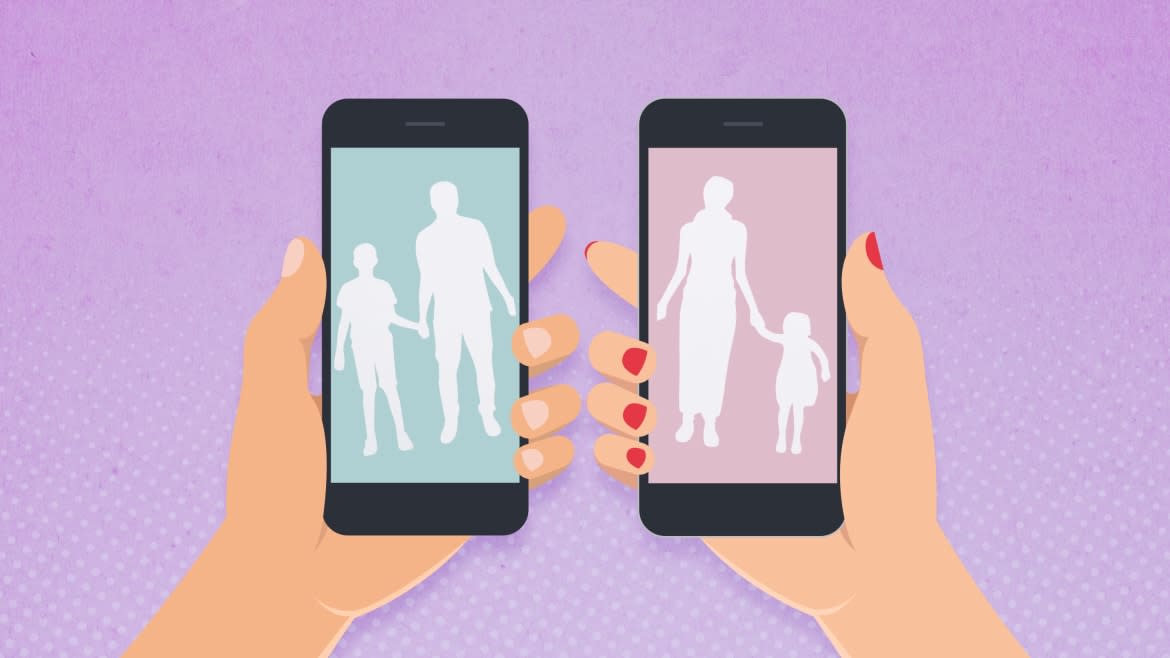How a Co-Parenting App Saved My Divorce

After the divorce, the last person I wanted to talk to was my ex-husband. If we didn’t have children, I would never talk to him ever again, especially after the negativity that shadowed the last decade of my life.
Kids mean constant communication though. From a favorite stuffed animal left behind, to a lost homework folder, to a forgotten soccer cleat, talking about your child’s life happens almost daily. A quick text can easily become flared-up hysteria when it comes to divorced parents who don’t see eye to eye, creating an enormous amount of extra stress.
But then, something changed. Last fall, we went through mediation, and the court ordered that both parents purchase and use a co-parenting communication tool called OurFamilyWizard (OFW) to discuss anything related to our children. My eyebrow arched. It sounded weird to me. How could an app help with co-parenting?
Before that day, I received thousands of aggressive text messages and overbearing emails during the past three years while sharing time with our kids week to week. And every harsh word sizzled in my veins on Sunday drop-off when the kids switched homes. I’ll admit, sometimes I wanted to speak my mind and reacted emotionally because of the hurt and frustration that stemmed from an unsuccessful marriage.
Now it was ordered in the divorce decree to purchase OFW for around $150/yr, and to sign up within a few days. It sounded like a lot of money. But more importantly: Why would I pay to talk to my ex?
During the divorce process the use of apps designed for coordinating schedules, accountable calling and texting, storage of parenting plans or custody documents can be helpful for putting the children first and shielding them from any parent-to-parent conflicts, Leslie Taylor, a psychologist with UTHealth Houston, told me in an email.
Taylor encourages parents to develop a mechanism for communicating (e.g. text, email, call) information about their child just prior to drop-off/ pickup with the other parent. (Usually, I let my children’s father know that I’m “On the way” or I keep it short with simply four letters: “Here.”)
OFW founder Paul Volker launched the software brand in 2021 after experiencing communication and scheduling mishaps in his own blended family. Since then, its website, iOS, and Android applications have been used by over 1 million parents and law professionals.

Isobella Jade felt that a co-parenting app helped her be "more confident and shielded" from her toxic ex.
If the app wasn’t now ordered in our divorce decree to be used as our main communication source, then I probably would not have downloaded it on my phone. I would be skeptical about another thing that involves my ex.
But, a few weeks later, I was hooked. The app created a boundary from my ex. I was no longer being bombarded with so many text messages that have nothing to do with the kids and others that turn a quick reminder into chaos. Some messages asked me to pick up packages at his home, like I was his maid. Another was an audio clip from a fight we had during the marriage that I didn’t know was being recorded at the time.
There were screenshots of break-up letters and emails he wrote before we had kids that put me down for making less money than he did. He sent photos reminding me about how I left laundry unfolded on the couch back when the children were babies. In between these messages were others bullying me and proclaiming me a terrible parent for forgetting a soccer sock at drop-off, and telling me “see you in court” every month.
With a co-parenting app as our main communication tool now, I still receive some insults but I noticed that the app messages were less intense. I even received a thank you in one message. And since the app is ordered in my decree, this means when a message is written both parties should assume that all messages could end up in front of a judge at some point. Knowing messages on the app are admissible as evidence should it be needed, is also a reason to keep using it, especially after a high-conflict divorce.
With text messaging, I often felt the need to reply right that second. However, using a co-parenting app allows me to slow down, think, and put my emotions aside. I use text messaging now to refer to the co-parenting app: “see my response in the app” or “check my message in the app when you have a second.”
On the app the emails are all stored by date order, and I can see when one was sent and read. There is a color-coded calendar to post your kids' activities, an expense calendar for things like school supplies, and there’s even a check-ins section where you can create an entry to show that you and your child were at soccer practice, a doctor’s appointment, etc. I just started using the journal section to preserve my monthly co-parenting notes.
My favorite tool is the ToneMeter. When I’m sending a message, say, with a reminder about a half-day of school coming up or my daughter needing a green shirt for Field Day, at the bottom of the email there is a “meter.” It provides feedback on how the tone of the message may be perceived and if it may be best to re-word something before sending.
Collectively, the tools allow you to communicate with your co-parent as you would a colleague.
Elon Musk Wants to Replace the Government With X the Everything App
An OFW spokesperson told me that most parents find out about the app through their family law professionals or the court. Courts in all 50 states routinely order the use of OFW in divorce cases. Many parents also learn about the app through word-of-mouth sources such as social media, online support groups, and podcasts centered around divorce and co-parenting.
There are many other co-parenting apps like Onward, Custody X Change, and Cozi too. I wish I had researched these when I was going through the divorce process.
Some recent messages have been about pickups and drop-offs, holiday possession, a miscommunication about the school auction bid, expenses involving the kids, which parent will bring which child to which activities during a calendar conflict, and a request from the other parent to take the kids somewhere unexpectedly and interfere with my time with the children, to which I sent a short reply: “No.”
Before the app co-parenting communication meant readdressing the what, where, and when in text messages over and over. It got confusing and frustrating scrolling back to whatever day something specific was sent about the kids if there was a conflict. I often felt like my messages were unread or blown off.
Kim Kardashian Opens Up About Co-Parenting With Kanye West: It’s Really F*cking Hard
The app helps to provide accountability and transparency for our kids’ sake and it lowers my anxiety and helps my mental health to know everything is in one place. With more accountability it helps me feel like we are “working together.” Now I can weed through my ex’s messages and focus on what is important and best for the kids and forget the rest, this is a relief.
Michelle Dempsey-Multack, a co-parenting coach and expert, uses a co-parenting app too. She said on her podcast that parents have enough to worry about. “I can go to bed knowing those things are stored in my phone,” she said. “They can’t go anywhere, they can't be proven wrong… It’s peace of mind.”
Dempsey-Multack says the trick is to treat co-parenting like a business and that you don’t have to even like your ex to make co-parenting work. She suggests keeping communication short and to the point and on a need-to-know basis.
I feel this.
Over the past months, I’ve felt more confident and shielded from toxic energy knowing the OFW app is in my pocket, and I can focus on making joyous memories with my kids and my own self-growth without my heart racing every time my phone dings.
While the company says they are on a mission to help families living separately thrive, my communication with my ex is not thriving per se—and it may never be. But I will be using the co-parenting app until both of my kids reach the age of 18. I like that during a face-to-face encounter at one of my kids’ activities I can say, “Take it to the app,” especially if I’m not in the mood for the eye-rolling drama or insults coming my way.
Isobella Jade is an author and essayist based in Houston.
Get the Daily Beast's biggest scoops and scandals delivered right to your inbox. Sign up now.
Stay informed and gain unlimited access to the Daily Beast's unmatched reporting. Subscribe now.


